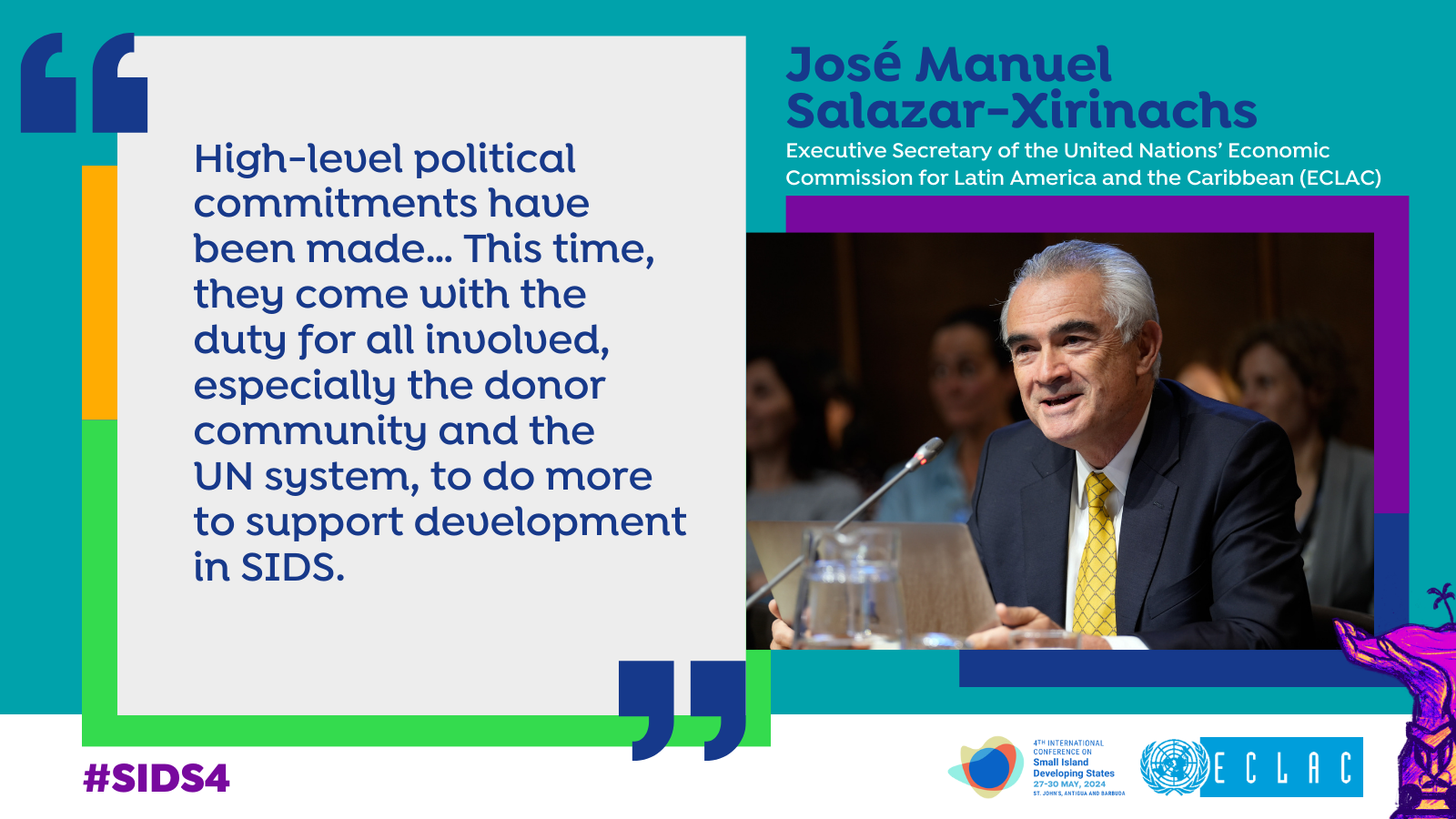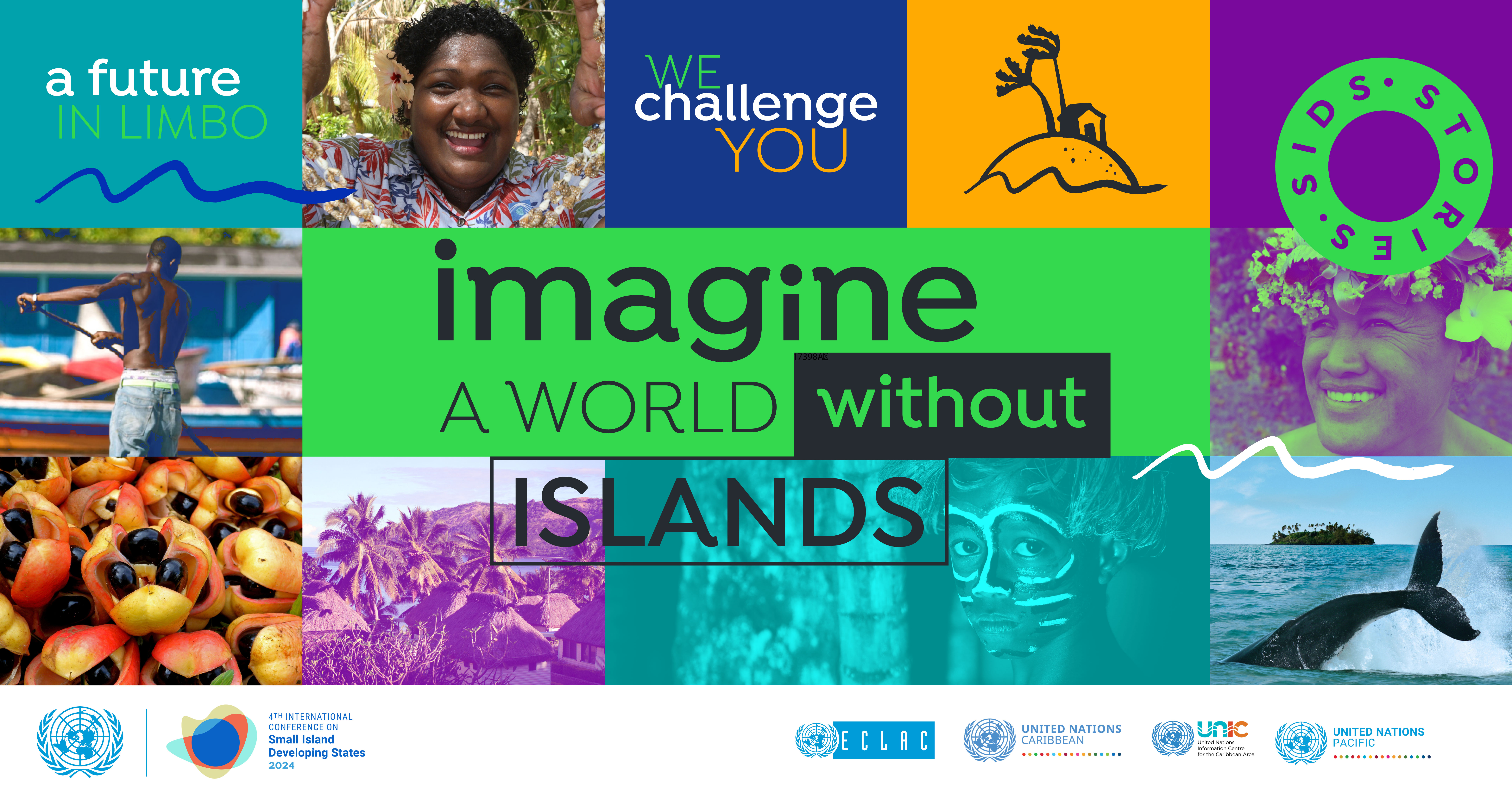Securing Greater and Sustained Access to Long-term, Low-cost Finance for Small Island Developing States (SIDS)
Work area(s)
Op-ed by José Manuel Salazar-Xirinachs, Executive Secretary of ECLAC.

The leadership of the United Nations and the wider international community, including over fifty Heads of Government and Heads of State, are focusing on the smallest and most vulnerable member countries this week with the Fourth International Conference on Small Island Developing States (SIDS4) in Antigua and Barbuda. This meeting reviews the sustainable development progress of SIDS over the past decade and adopts a new action platform for the next ten years.
Of the 57 countries identified as SIDS by the UN, 29 are in the Caribbean, comprising 16 member States and 13 territories. The Economic Commission for Latin America and the Caribbean (ECLAC) is committed to providing essential, targeted support to this subregion in its pursuit of sustainable development. The 2024 Atlantic hurricane season, beginning on June 1st, just two days after the conference ends, is predicted to be the hottest and most active season on record, underscoring the extreme vulnerability of these countries to climate-related impacts.
Beyond their vulnerability to climate change, the subregion faces high levels of debt, a consequence of low growth and high financing costs in capital markets, compounded by the increasing frequency and severity of hurricanes and tropical storms. In 2017, category 5 hurricanes Irma and Maria caused extensive damage in the Caribbean amounting to approximately US$97 billion, and Hurricane Dorian in 2019 resulted in US$3.4 billion in losses and damage in The Bahamas alone.
The subregion also faces fiscal stress due to other external shocks. The COVID-19 pandemic crippled the tourism-dependent economies of the Caribbean, pushing many governments to the brink of insolvency. Amid high debt and servicing costs, public investment in social infrastructure and services has stagnated or even declined in some cases.
The Caribbean's debt constraint and its impact on growth are well recognized. ECLAC’s econometric analysis reveals a negative relationship between debt and growth in the Caribbean. Since the global crisis of 2008-2009, the Caribbean has not experienced robust growth, and its trade and foreign direct investment (FDI) performance have also declined. Six SIDS have debt-to-GDP ratios exceeding 100%. Genuine development and planned resilience are unattainable when scarce resources are diverted to debt repayment.
High indebtedness negatively impacts sovereign credit ratings, subjecting the Caribbean to higher borrowing costs. However, the subregion has limited access to concessional finance for investment in resilience and growth due to their upper-middle and high-income status, a metric that ignores their high vulnerability and capacity constraints.
The principal message of the SIDS4 Conference is the urgency of securing greater and more sustained access to long-term, low-cost finance for these small countries. This is reinforced by their call for “a seat at the table” where decisions regarding the reform of the global financial architecture will be made.
ECLAC has been integrally involved in supporting this effort. During the preparatory stage, ECLAC assessed development progress in Caribbean SIDS over the past decade. The Commission also led the preparation for a key interactive dialogue at SIDS4 on “Enhancing critical forms of financing and aid effectiveness through collaborative partnerships: A conversation.” Along with the dialogue on climate finance, this is a crucial discussion, as the most formidable obstacle that SIDS face is how to secure access to finance for investment in their sustainable development.
ECLAC is also launching the OPCC Parliamentary Observatory on Climate Change and Just Transition, providing parliamentarians in the Caribbean and Latin America with a common data platform to support their leadership and legal precedent in environmental legislation. Recognizing the importance of data for informed decision-making, ECLAC will co-lead five side events, including three addressing geospatial information management.
Prime Minister Gaston Browne, the government, and the people of Antigua and Barbuda deserve commendation for organizing and hosting this significant conference. Their tireless efforts have ensured its success. The conference’s outcome document, The Antigua and Barbuda Agenda for SIDS (ABAS), focuses on partnerships, more effective support from the United Nations, and the basic development rights of island people, all framed around the Sustainable Development Goals. It also calls for more robust international support to accelerate the implementation of the Paris Agreement on climate change and for the early capitalization and operationalization of the proposed Loss and Damage Fund.
The SIDS4 Conference anticipates tangible outcomes, including the launch of a SIDS Centre of Excellence, which will encompass a SIDS Data Hub, a technology and innovation mechanism, and an Island Investment Forum. This initiative aims to provide the necessary social and economic support that SIDS need to plan their strategy for survival and resilient prosperity.
Attention is also being given to the development of a Multidimensional Vulnerability Index, acknowledging the impact of a country’s vulnerabilities on its development trajectory. Additionally, a Debt Sustainability Support Initiative is set to launch, promising multifaceted and innovative support for debt-strapped SIDS. ECLAC and other regional commissions eagerly await the design document’s presentation and the service’s operationalization to offer support to the world's islands.
To promote public awareness of this significant meeting for the Caribbean, the commission has created an impactful campaign, encouraging the world to "Imagine a World without islands." This thought-provoking campaign highlights the cultural, environmental, and economic contributions of islands, emphasizing the necessity of their preservation and support.
High-level political commitments have been made, but they come with compromises from all sides. This time, they come with the duty for all involved, especially the donor community and the UN system, to do more to support development in SIDS. ECLAC is firmly committed to this effort.
Source URL
Related content

“Imagine a World Without Islands” campaign Hands Megaphone to Island People Ahead of SIDS4 Conference
The United Nations Information Centre for the Caribbean Area (UNIC Caribbean) and the United Nations Economic Commission for Latin America and the Caribbean subregional headquarters for the Caribbean…
Type
Subregional headquarter(s) and office(s)
Country(ies)
- Caribbean
Related link(s)
Attachment(s)
Contact
Public Information Unit
- prensa@cepal.org
- (56 2) 2210 2040
ECLAC Caribbean media
- spou-pos@un.org
- 868 708 1769